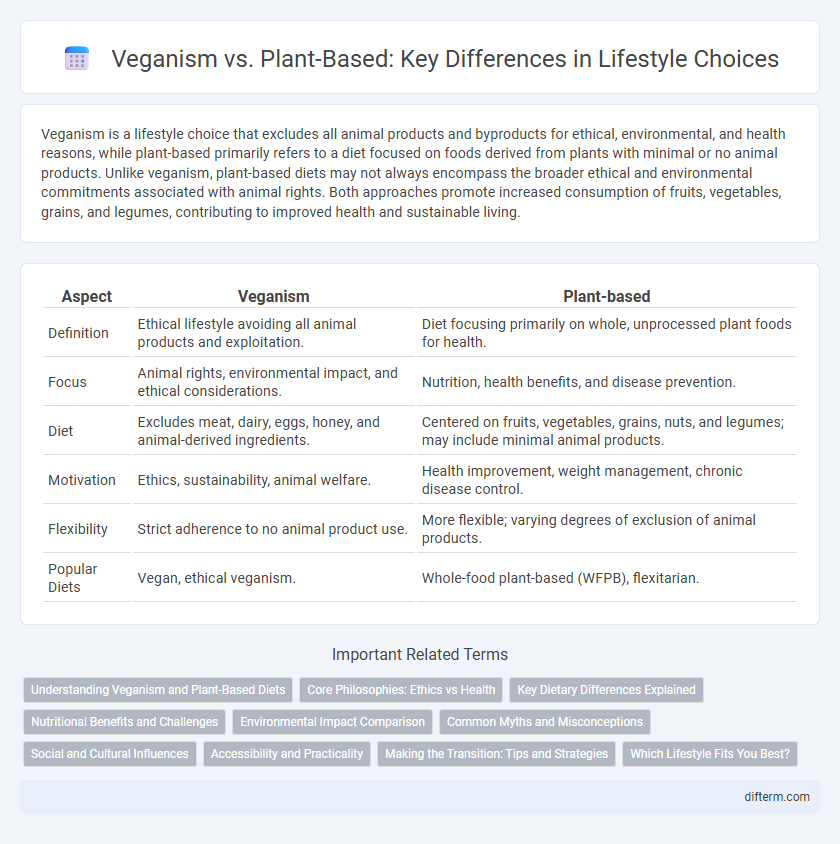Veganism is a lifestyle choice that excludes all animal products and byproducts for ethical, environmental, and health reasons, while plant-based primarily refers to a diet focused on foods derived from plants with minimal or no animal products. Unlike veganism, plant-based diets may not always encompass the broader ethical and environmental commitments associated with animal rights. Both approaches promote increased consumption of fruits, vegetables, grains, and legumes, contributing to improved health and sustainable living.
Table of Comparison
| Aspect | Veganism | Plant-based |
|---|---|---|
| Definition | Ethical lifestyle avoiding all animal products and exploitation. | Diet focusing primarily on whole, unprocessed plant foods for health. |
| Focus | Animal rights, environmental impact, and ethical considerations. | Nutrition, health benefits, and disease prevention. |
| Diet | Excludes meat, dairy, eggs, honey, and animal-derived ingredients. | Centered on fruits, vegetables, grains, nuts, and legumes; may include minimal animal products. |
| Motivation | Ethics, sustainability, animal welfare. | Health improvement, weight management, chronic disease control. |
| Flexibility | Strict adherence to no animal product use. | More flexible; varying degrees of exclusion of animal products. |
| Popular Diets | Vegan, ethical veganism. | Whole-food plant-based (WFPB), flexitarian. |
Understanding Veganism and Plant-Based Diets
Veganism is a lifestyle that excludes all animal products and emphasizes ethical choices to avoid animal exploitation, while a plant-based diet primarily focuses on consuming whole, minimally processed plant foods for health benefits. Veganism encompasses not only dietary habits but also choices in clothing, cosmetics, and other areas to prevent animal suffering. Plant-based diets prioritize nutrient-dense fruits, vegetables, grains, nuts, and legumes to support optimal wellness and reduce the risk of chronic diseases.
Core Philosophies: Ethics vs Health
Veganism centers on ethical considerations, emphasizing animal rights, environmental sustainability, and the elimination of animal exploitation in all aspects of life. Plant-based diets prioritize health benefits, focusing on consuming whole, minimally processed plant foods to improve nutrition, reduce chronic disease risk, and enhance overall well-being. While both lifestyles share a commitment to plant consumption, veganism advocates for systemic change in animal welfare, whereas plant-based eating is primarily motivated by personal health outcomes.
Key Dietary Differences Explained
Veganism eliminates all animal products from the diet and lifestyle, emphasizing ethical and environmental motives, while plant-based diets primarily focus on consuming whole, minimally processed plant foods for health benefits without strict avoidance of animal-derived items. Key dietary differences include veganism's rigid exclusion of dairy, eggs, and honey versus plant-based diets allowing occasional animal products depending on personal health goals. Understanding these distinctions helps individuals choose a diet aligned with their ethical beliefs or nutritional objectives.
Nutritional Benefits and Challenges
Veganism eliminates all animal products, offering high fiber, antioxidants, and reduced cholesterol, but may lead to vitamin B12, iron, and omega-3 deficiencies without careful planning. A plant-based diet emphasizes whole, minimally processed foods, enhancing nutrient density and cardiovascular health, while posing challenges such as protein adequacy and ensuring sufficient vitamin D intake. Both diets demand mindful nutrient supplementation and balanced meal planning to maximize health benefits and minimize risks.
Environmental Impact Comparison
Veganism eliminates all animal products, significantly reducing greenhouse gas emissions compared to omnivorous diets, while plant-based diets emphasize whole, minimally processed foods with similarly low environmental footprints. Both dietary approaches contribute to decreased water usage and deforestation rates associated with livestock farming. Studies highlight that adopting either vegan or plant-based diets can lower carbon footprints by up to 50%, promoting sustainable food systems and biodiversity conservation.
Common Myths and Misconceptions
Many believe veganism and plant-based diets are interchangeable, but veganism excludes all animal products for ethical reasons, while plant-based focuses primarily on health benefits. A common myth is that plant-based diets lack sufficient protein, yet numerous studies show diverse plant foods provide ample protein and essential nutrients. Misconceptions also include the idea that vegan diets are inherently expensive or nutritionally deficient, though careful planning ensures affordability and balanced nutrition.
Social and Cultural Influences
Veganism often arises from ethical and social justice movements advocating for animal rights, influencing cultural norms around compassion and environmental responsibility. Plant-based diets primarily emphasize health benefits, shaping culinary trends and wellness communities without necessarily adopting the ethical framework of veganism. Both lifestyles intersect with cultural identities, where social acceptance and media representation play crucial roles in their growing popularity worldwide.
Accessibility and Practicality
Veganism often requires strict adherence to excluding all animal products, which can limit accessibility in certain regions or social settings, whereas plant-based diets emphasize whole, minimally processed plants and offer more flexibility. Practically, plant-based eating is easier to maintain for many due to fewer restrictions, enabling gradual shifts toward healthier habits. Accessibility improves with plant-based approaches as they accommodate diverse preferences, dietary needs, and availability of ingredients, making them more sustainable for long-term lifestyle changes.
Making the Transition: Tips and Strategies
Transitioning to veganism or a plant-based diet involves gradual meal planning and incorporating diverse nutrient-rich foods like legumes, nuts, and leafy greens to ensure balanced nutrition. Utilizing resources such as recipe apps, support groups, and nutritionist consultations enhances adherence and reduces common challenges like nutrient deficiencies or social dining situations. Prioritizing whole, minimally processed foods and mindful eating habits supports sustainable lifestyle changes while minimizing environmental impact and promoting health benefits.
Which Lifestyle Fits You Best?
Veganism and plant-based diets both emphasize plant consumption but differ in scope; veganism extends to avoiding all animal-derived products in food, clothing, and lifestyle choices, whereas plant-based primarily focuses on eating whole, minimally processed plants for health benefits. Choosing the best fit depends on personal values--ethical considerations, environmental impact, or health goals--since vegans prioritize animal rights while plant-based followers often center on nutrition and wellness. Evaluating your motivations and lifestyle preferences helps determine whether a strict vegan lifestyle or a flexible plant-based approach aligns with your goals.
Veganism vs Plant-based Infographic

 difterm.com
difterm.com